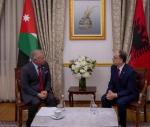You are here
The Taliban's gender crimes against humanity
Aug 13,2023 - Last updated at Aug 13,2023
EDINBURGH — Gender persecution is a grievous crime against humanity. Having established gender apartheid by denying girls and women access to education, many members of the Taliban regime in Afghanistan can and should be held accountable under the International Criminal Court’s (ICC) Rome Statute.
On the second anniversary of the Taliban’s reconquest, the ICC’s chief prosecutor should take legal action against the individuals responsible for what are the most egregious, heinous and vindictive abuses of human rights systematically and viciously imposed on girls today. If allowed to continue without sustained international opposition, these abuses will set a terrifying precedent for other regimes where discrimination against women remains endemic.
The time is right to do so: after two years of ever-intensifying repression, there appears to be division within the regime in Kabul, which has far too casually implemented a series of edicts from religious clerics based in Kandahar. To complement the independent actions of the ICC, the international community can take several initiatives now that could add pressure for policy changes.
Leaders from Muslim-majority countries should form a delegation and visit Afghanistan to meet not only with the Taliban but also with the country’s religious elders. But even before that happens, these leaders and their Western counterparts must step up their efforts.
The United States, the United Kingdom and other global powers should follow the European Union’s lead in sanctioning those directly responsible for denying girls education. They should make resources available to online platforms to provide remote education and do more to finance underground schools for all of Afghanistan’s children, male and female, so that schooling can proceed even in the face of the current ban. Such initiatives could also help Afghan girls access education beyond the country’s borders in Pakistan and help sustain at least some of the progress made in the two decades before August 2021. At the same time, if the Taliban does reverse course and agrees to grant girls consistent and unrestricted access to education, the world must be ready to offer financial support.
The legal recommendations stem from an exhaustive review spearheaded by scholars detailing the grim situation facing Afghan girls and the Taliban’s violation of international human-rights treaties. Their efforts painstakingly document just how far the regime has gone in excluding women and girls from secondary and tertiary education, and just how far Afghanistan has fallen short of upholding the Convention on the Elimination of all Forms of Discrimination Against Women (CEDAW).
The Taliban regime has also disregarded its responsibilities under the International Covenant on Economic, Social, and Cultural Rights (ICESCR), as well as the Convention on the Rights of the Child (CRC). Its discriminatory practices against women and girls blatantly breach these conventions and have rightly drawn widespread condemnation. The CEDAW Committee, the CRC Committee, and other notable figures have all denounced the Taliban’s regressive policies. Richard Bennett, the UN Special Rapporteur on Human Rights in Afghanistan, told the UN Human Rights Council that “grave, systematic, and institutionalised discrimination against women and girls is at the heart of Taliban ideology and rule, which also gives rise to concerns that they may be responsible for gender apartheid”.
Of course, Afghanistan has not ratified the instruments essential to implementing the CEDAW, the ICESCR, or the CRC. Nonetheless, the international community could pursue accountability through other means, including the reporting requirements and monitoring mechanisms that were established under these treaties. These allow bodies like the CEDAW Committee to enlist rapporteurs whose investigations would maintain continuous scrutiny of the Taliban’s actions.
International criminal law offers an even larger window through which to sanction the Taliban. The United Nations has acknowledged education as an “enabling right” that is crucial for realising other human rights, and the Taliban’s educational prohibitions clearly constitute gender-based persecution. According to the ICC’s December 2022 Policy on the Crime of Gender Persecution, actions that deprive individuals of their fundamental rights, including education, fall under this category.
Many countries could also leverage their domestic legal frameworks to condemn and respond to the Taliban’s suppression of women and girls’ rights, including, potentially, through targeted sanctions.
All of these options should be on the table, because the need to assist Afghan girls has become more urgent than ever. Of the 80 edicts issued by the Taliban between August 2021 and last January, 54 target women and dismantle their rights. Recently, the regime issued additional bans on women and girls’ participation in university medical exams, visits to cemeteries, and other activities. The ministry of women’s affairs has become the feared ministry for the propagation of virtue and the prevention of Vice, and the Afghan Independent Human Rights Commission has been dissolved, while legislation guaranteeing gender equality has been invalidated.
Even under intensifying repression by the Taliban, many Afghan women and girls remain defiant, attending covert schools and seeking university-level education online. Tragically, however, global support for their cause has been underwhelming.
To be sure, many governments, including in other Muslim-majority countries, have voiced objections to the Taliban’s policies, citing religious scripture that disapproves of such discrimination. Their condemnations should be applauded, but protecting Afghan women and girls’ rights also demands a greater international mobilisation.
As we in the international community respond to these issues, we must urge the ICC to use the anniversary of the Taliban’s return to power to open an investigation into its grave rights violations. The regime’s blatant disregard for international treaties, and especially its exclusion of women and girls from education, must no longer be ignored.
The spirit of the Afghan people is withstanding even the harshest punishments that the Taliban can mete out. Afghanistan’s women and girls continue to fight for their rights despite the reality of near-certain retribution. The world must stand with them.
Gordon Brown, a former prime minister of the United Kingdom, is UN special envoy for Global Education. Copyright: Project Syndicate, 2023.












